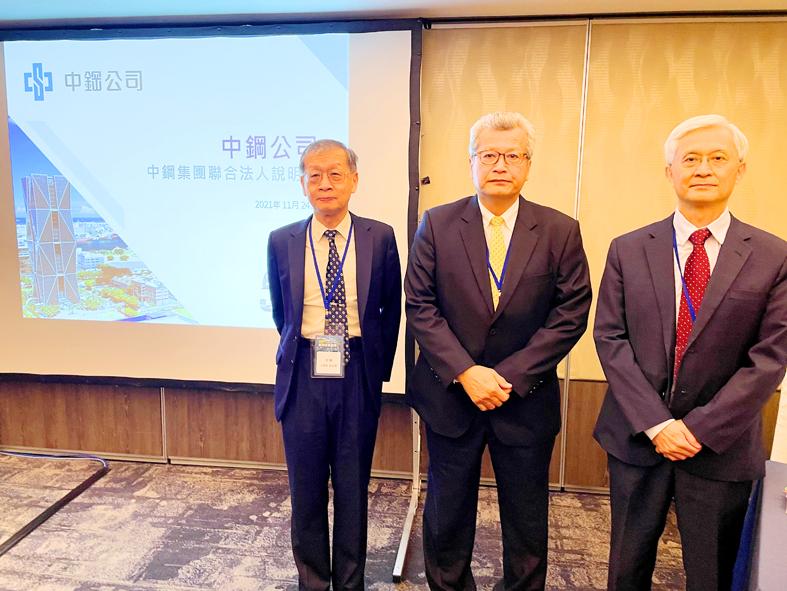China Steel Corp (CSC, 中鋼) expects steel demand to increase on the back of governments around the world subsidizing infrastructure construction amid a stabilizing COVID-19 pandemic, CSC chairman Wong Chao-tung (翁朝棟) told an investors’ meeting yesterday.
“After getting through the hard times, I foresee at least one year, very possibly two years, of strong steel market,” Wong said.
Calling a dip in steel prices a “short respite for the market,” Wong said that it would likely bounce back early next year on the back of mild winter temperatures around the world allowing construction activity.

Photo: Lin Ching-hua, Taipei Times
Despite COVID-19 spikes in some regions and increased calls for carbon-neutral steel production, the company is looking forward to a “positive development” in the steel market on the back of higher commodity prices and continued strong worldwide demand, Wong said.
“Countries around the world, especially the US, are investing in infrastructure projects, leading to strong steel demand,” Wong said. “The whole world is fighting to boost the economy.”
Pressure to transition to more climate-friendly production methods would be offset by higher prices, he said.
“Nippon Steel predicted that carbon neutrality targets will increase the cost of steel by more than 10 percent,” Wong said. “The era of high-priced steel has arrived.”
CSC executive vice president Hwang Chien-chih (黃建智) said that recent softness in the steel market was due to logistics logjams and a lack of clarity in Chinese markets.
“The demand will likely be pushed into the first half of next year,” Hwang said. “The mid to long-term prospects of the steel market has not been affected.”
The World Steel Dynamics report predicted rising steel prices in the first half of next year amid rebounding demand in China, Hwang said.
However, the report forecasts the rebound to dissipate in the second half of the year, causing pieces to fall, Hwang added.
“It’s not certain that the prices of steel will fall. It will depend on what decarbonization policies we see from countries around the world, and also whether steel price will be supported by continued high commodity prices,” Hwang said.
“Iron ore prices shot up by more than 20 percent in the past three days, back to US$99.45 per tonne, and prices will likely stay above US$100 per tonne, while coking coal prices remain high at US$317 per tonne,” Hwang said. “Both commodities will lend strong support to steel prices.”

US SANCTIONS: The Taiwan tech giant has ended all shipments to China-based Sophgo Technologies after one of their chips was discovered in a Huawei phone Taiwan Semiconductor Manufacturing Co (TSMC, 台積電) suspended shipments to China-based chip designer Sophgo Technologies Ltd (算能科技) after a chip it made was found on a Huawei Technologies Co (華為) artificial intelligence (AI) processor, according to two people familiar with the matter. Sophgo had ordered chips from TSMC that matched the one found on Huawei’s Ascend 910B, the people said. Huawei is restricted from buying the technology to protect US national security. Reuters could not determine how the chip ended up on the Huawei product. Sophgo said in a statement on its Web site yesterday that it was in compliance with all laws

SPEED OF LIGHT: US lawmakers urged the commerce department to examine the national security threats from China’s development of silicon photonics technology US President Joe Biden’s administration on Monday said it is finalizing rules that would limit US investments in artificial intelligence (AI) and other technology sectors in China that could threaten US national security. The rules, which were proposed in June by the US Department of the Treasury, were directed by an executive order signed by Biden in August last year covering three key sectors: semiconductors and microelectronics, quantum information technologies and certain AI systems. The rules are to take effect on Jan. 2 next year and would be overseen by the Treasury’s newly created Office of Global Transactions. The Treasury said the “narrow

TECH TITANS: Nvidia briefly overtook Apple again on Friday after becoming the world’s largest company for a short period in June, as Microsoft fell to third place Nvidia Corp dethroned Apple Inc as the world’s most valuable company on Friday following a record-setting rally in the stock, powered by insatiable demand for its specialized artificial intelligence (AI) chips. Nvidia’s stock market value briefly touched US$3.53 trillion, slightly above Apple’s US$3.52 trillion, London Stock Exchange Group data showed. Nvidia ended the day up 0.8 percent, with a market value of US$3.47 trillion, while Apple’s shares rose 0.4 percent, valuing the iPhone maker at US$3.52 trillion. In June, Nvidia briefly became the world’s most valuable company before it was overtaken by Microsoft Corp and Apple. The tech trio’s market capitalizations have been

Two scoops of pistachio, one of corruption. For years holidaymakers have guzzled Sicilian gelato at famous parlors in Palermo, unaware that the booming businesses were controlled by organized crime. The fraud was a textbook case for detectives trained to sniff out dirty money, but even with three mobster classics — a suspicious bankruptcy, a front man and a scheming “Godfather” — it took years for investigators to shut the operation down. The Brioscia brand, made up of two ice cream parlors, was thriving at the end of the 2010s, attracting locals and foreign visitors alike with its glittering gold stars on travel